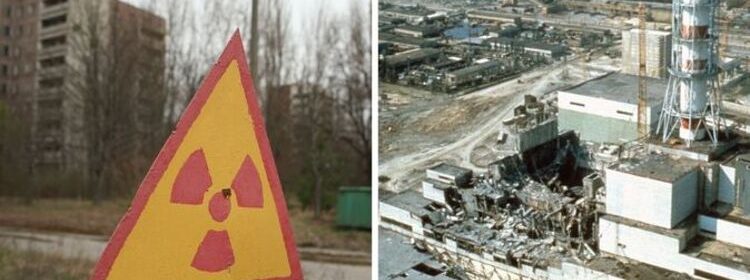Chernobyl: Kremlin tried to deflect blame for disaster onto CIA with own TV drama

Ukraine: Prystaiko confirms Russian troops in Chernobyl
We use your sign-up to provide content in ways you’ve consented to and to improve our understanding of you. This may include adverts from us and 3rd parties based on our understanding. You can unsubscribe at any time. More info
Russian forces have seized control of the Chernobyl nuclear power plant, Ukrainian officials confirmed this morning. Mykhailo Podoliak, adviser to Ukrainian President Volodymyr Zelenskyy, blasted the Kremlin for the “totally pointless attack” that has caused “one of the most serious threats in Europe today”. An explosion at the nuclear power plant in 1986, near the abandoned city of Pripyat, led to the worst nuclear accident in history, both in cost and casualties. Only two nuclear energy accidents have been rated at seven — the maximum — on the International Nuclear Event Scale, the other being the Fukushima disaster in Japan 11 years ago.
Chernobyl’s exclusion zone, a 32km (19 mile) radius around the plant, remains bereft of human life some 36 years after a flawed design and series of errors caused a major explosion at the site.
Radiation levels in the nearby area are still higher than normal as a result of the leak, as documented in HBO’s eponymous, Golden Globe-winning miniseries, ‘Chernobyl’.
The 2019 series focused on the disaster and subsequent cleanup efforts, with a podcast accompanying each episode to explain the minor changes for dramatic purposes.
The five-part series, however, deeply angered the Kremlin — with Russian television channel NTV allegedly planning to provide a patriotic spin on events.
The HBO series praised the self-sacrifice of those who fought to contain the fire and to limit the effects of a reactor being destroyed by flames.


It also covered the Soviet mismanagement of the site, the delayed response to the disaster, and also the years of denial of any design fault.
Officials at the time attempted to blame the explosion on a badly handled test, by a group of incompetent plant managers.
The World Nuclear Association says of the disaster: “The April 1986 disaster at the Chernobyl nuclear power plant in Ukraine was the product of a flawed Soviet reactor design coupled with serious mistakes made by the plant operators.
“It was a direct consequence of Cold War isolation and the resulting lack of any safety culture.”
Russian media took particular offence to the HBO series, as Moscow weekly Argumenty i Fakty labelled the show a “caricature and not the truth” in a 2019 comment piece.

Stanislav Natanzon, an anchor at Russia-24, a state-owned Russian news outlet, added: “The only things missing are the bears and the accordions!”
No Russian media outlet broadcast the HBO mini-series, but it was available online to paying viewers.
NTV, which is owned by Kremlin-controlled energy supplier Gazprom, planned to run its own series that suggested foreign-inspired conspiracy may have played a part in the explosion.
The plot, according to a 2019 report in Voa News, revolves around a CIA agent that had infiltrated into Pripyat, and was tasked with gathering intelligence on the Chernobyl plant.
Russia’s culture ministry reportedly helped fund the NTV show with a $460,000 (£343,000) grant.
DON’T MISS:
Russia soldiers stand down as they ‘didn’t know they were sent to kill [REPORT]
Ukraine war: ‘F*** you doing in our land?’ BRILLIANT takedown [NEW]
Ukraine fury over NATO report as Putin wages terrifying war [QUOTES]

The apparent ‘hero’ of the NTV drama is a Russian counterintelligence agent sent to track him down.
Despite the fact there is no evidence of any CIA agent ever being present, the show’s director promised his drama would “tell viewers about what really happened back then”.
On April 27, 1986, the day after the disaster, inhabitants of Pripyat began to be evacuated.
The USSR attempted to cover up the disaster, but Swedish monitoring stations detected an abnormally high level of wind-transported radioactivity the next day and demanded an explanation.

The Kremlin eventually acknowledged the accident, but then-Soviet leader Mikhal Gorbachev did not comment on it publicly for three weeks.
He maintained, however, that there was no cover up, telling the Associated Press in 2006: “I can’t agree that we were trying to conduct a sly policy and hide something. We realised the entire drama only later.”
By May 4, the heat and radioactivity leaking from the site had been contained, albeit at great risk to the people involved in the emergency response.
Of those involved, 134 station staff and firemen were hospitalised with acute radiation syndrome due to absorbing high doses of ionising radiation.
The Kremlin eventually acknowledged the accident, but then-Soviet leader Mikhal Gorbachev did not comment on it publicly for three weeks.
Of these, 28 people died in the days and months afterwards, and a further 14 suspected radiation-induced cancer deaths followed within the next decade.
Ilya Shepelin, a broadcaster with independent Russian media outlet Dozhd, wrote in the Moscow Times in 2019: “The fact that an American, not a Russian, TV channel tells us about our own heroes is a source of shame that the pro-Kremlin media apparently cannot live down.”
It is unclear if the Russian drama about the Chernobyl disaster was ever released, but it would not be the first time NTV had produced a controversial documentary reflecting Kremlin ideology.
A 2014 documentary described critics of Russian policies in Ukraine as “fascists” and “traitors” and, according to the Moscow Times, reportedly showed footage of Andrei Makarevich’s concert in Sviatohirsk “merged with images of the fighting that he supposedly endorsed.
“The program never mentions that the concert was for the benefit of Ukraine’s internally displaced children.”
Source: Read Full Article
